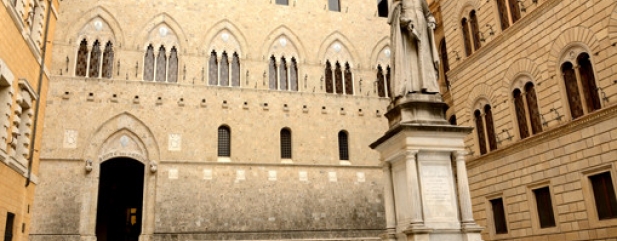Archived article
Please note that tax, investment, pension and ISA rules can change and the information and any views contained in this article may now be inaccurate.
Italy’s banking stand-off weighs on markets

Banca Monte Paschi di Siena (BMPS:BIT) is the world’s oldest surviving bank though that record looks increasingly in jeopardy.
Struggling with non-performing loans, BMPS has laid out new financing plans valued at €5bn (£4.2bn) which may be put under threat by uncertainty around a 4 December referendum.
Prime Minister Matteo Renzi is campaigning for changes to the constitution which would give the country’s executive government branch more power and stability between elections.
Political logjam
If defeated it’s likely Renzi would resign and plunge the country into another political logjam – not a good environment for resolving some €400m (£340m) of soured loans across a struggling banking system.
BMPS is front and centre of the crisis: the bank’s problems are more or less summed up by its decision to launch a 100-for-one share split on 28 November so that its stock price is now quoted in whole euros rather than cents.
Shares in BMPS have fallen 90% in the last year as investors mull whether the bank can be saved without resort to a controversial ‘bail-in’ under new European Union rules.
Recovery and resolution
Since January 2016, bank bail-outs must now be executed through a mechanism called the Recovery and Resolution Directive rather than the direct government cash injections which were used in the 2008 financial crisis.
Recovery and Resolution means ‘bailing in’ bond holders – forcibly converting their bonds into equity – as well as, potentially, depositors who hold more than a protected threshold of €100,000 in savings.
Former Bank of England deputy chairman Paul Tucker said in 2013 that if bank losses were particularly large, even insured depositors might be forced to take losses.
Bailed in
Bondholders and depositors were ‘bailed in’ in the EU’s resolution of banks in Cyprus. Depositors below the insured threshold eventually survived unscathed despite rumours authorities were planning a universal 6.75% deposit tax.
Renzi wants to avoid this outcome. Italian retail investors hold many of the bonds of BMPS and other struggling banks, as well as facing potential deposit losses. A market solution is preferred, in which BMPS and other Italian banks including UniCredit would raise capital on commercial terms.
Investors want Italian banks to reveal the true scale of their non-performing loans to work out how much capital will be required and what returns might be available once balance sheets have been cleaned up.
Unfortunately, political uncertainty increases risk – for which investors demand higher returns. The more unstable Italy’s politics become, the larger its banking problems will grow. (WC)
Important information:
These articles are provided by Shares magazine which is published by AJ Bell Media, a part of AJ Bell. Shares is not written by AJ Bell.
Shares is provided for your general information and use and is not a personal recommendation to invest. It is not intended to be relied upon by you in making or not making any investment decisions. The investments referred to in these articles will not be suitable for all investors. If in doubt please seek appropriate independent financial advice.
Investors acting on the information in these articles do so at their own risk and AJ Bell Media and its staff do not accept liability for losses suffered by investors as a result of their investment decisions.
 magazine
magazine








